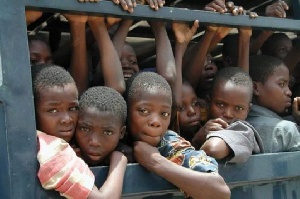Human trafficking has become the biggest challenge for developing countries as every year over thousands of people are trafficked either internally or externally with the promise to give them better jobs.
These people, mainly children, young ladies and men, are usually used by the traffickers to achieve their selfish personal interests.
Some are promised good jobs and education but when they get to their destinations, they find out that they were tricked, and most of them were forced into prostitution, fishing, and as farm hands as was the case in some parts of Ghana.
Mr Joseph Assan, Child Protection and Advocacy Specialist at Plan Ghana, an international non-governmental organisation, explained that in 2013, the Anti-human Trafficking Unit of the Ghana Police Service rescued 262 trafficked people during special operations country-wide.
He said the number might even be more than that as some trafficked people might have escaped notice by the Unit, since the Unit is under resourced and cannot be visible at all entry points to check on the activities of these traffickers.
He said the porous nature of the country’s entry points demands that the Ghana Police Service as well as the Unit should be resourced adequately to enable them prosecute the offenders to serve as a deterrent for others.
Mr Assan was speaking at an orientation workshop for Civil Society Organization (CSOs) and staff of shelters on a three-year project that Plan Ghana is about to embarked on.
The project, funded by the French Government, is to strengthen the capacity of CSOs involved in providing support to the fight against human trafficking and victims in the Gulf of Guinea countries.
So far, five countries namely, Ghana, Benin, Nigeria, Cameroon and Togo are benefiting from the project and the various French Embassies in the beneficiary countries would oversee the implementation of the project.
Plan Ghana and the French Embassy in Ghana are the implementing partners in Ghana. Under the component, Plan Ghana is to build capacity of CSOs working on human trafficking issues and staffs of shelters of victims of human trafficking on how to handle rescued and integrate them to their families and society effectively.
CSOs and Shelter staffs would be sensitized on legal and legislative framework relating to human trafficking, methods of psychological and social support towards the victims, raising awareness, improving empowerment of victims, report writing techniques, project management and fundraising as well as advocacy strategies, among others.
Ms Victoria Natsu, acting Head, Human Trafficking Secretariat of the Ministry of Gender, Children and Social Protection, in an interview with the Ghana News Agency said government of Ghana has two shelters currently operating and two others being renovated.
She said they are working on one multipurpose shelter and another one for vulnerable and rescued children in Accra and Wa in the Upper West Region and those two would soon be operational.
Ms Natsu said funding; trained staff and security to man the facilities were some of the major problems facing the shelters and expressed the hope that with programmes likes that of Plan Ghana things would improve.
She announced that the Gender Ministry would soon come out with Human Trafficking database collection data on the activities and commended the French Government for funding the project.
Over 200 million people are trafficked globally.
Regional News of Thursday, 18 September 2014
Source: GNA

















